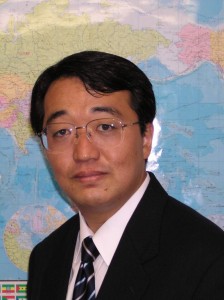緊張と統合:内村鑑三におけるキリスト教と日本の精神
このシリーズでは、私が1994年に執筆した統一神学大学院(Unification Theological Seminary)の神学課程修士論文(Divinity Thesis)を日英二か国語で掲載している。
序論の続き
日本における宣教活動の多大なる困難は、遠藤周作の小説「沈黙」の中に想像力豊かに表現されている。
日本に不法侵入したイエズス会の司祭ロドリゴと日本の役人との会話。1697年頃。
「パードレの宗旨、そのものの正邪をあげつろうておるのではない。エスパニヤの国、ポルトガル国、その他諸々の国には、パードレの宗旨はたしかに正とすべきであろうが、我々が切支丹を禁制にしたのは重々、勘考の結果、その教えが今の日本国には無益と思うたからである」・・・
「正というものは、我々の考えでは、普遍なのです」司祭は言った。「・・・もし正が普遍でないという気持ちがあれば、どうしてこの苦しみに多くの宣教師たちが耐えられたでしょう。正はいかなる国、いかなる時代にも通づるものだから正と申します。ポルトガルで正しい教えはまた、日本国にも正しいのでなければ正とは申せません」
・・・
「パードレたちは悉く同じことを言う。だが・・・ある土地では稔る樹も、土地が変われば枯れることがある。切支丹とよぶ樹は異国においては、葉も茂り花も咲こうが、我が日本国では葉は萎え、つぼみ一つつけまい。土の違い、水の違いをパードレは考えたことはあるまい」 (沈黙、pp.140-141)
ロドリゴと棄教した司祭フェレイラとの会話
「・・・お前の眼の前にいるのは布教に敗北した老宣教師の姿だ」・・・「二十年間、私は布教してきた」・・・「知ったことはただこの国にはお前や私たちの宗教は所詮、根をおろさぬということだけだ」
「根をおろさぬのではありませぬ」司祭は首をふって大声で叫んだ。「根が切りとられたのです」
だがフェレイラは司祭の大声に顔さえあげず眼を伏せたきり、意志も感情もない人形のように、「この国は沼地だ。やがてお前にも分かるだろうな。この国は考えていたより、もっと怖ろしい沼地だった。どんな苗もその沼地に植えられれば、根が腐りはじめる。葉が黄ばみ枯れていく。我々はこの沼地に基督教という苗を植えてしまった」(沈黙、pp.188-189)
遠藤の小説「沈黙」における沼地のイメージは、日本の文化的土壌に深く根ざした、全ての異質なものを拒否する自己淘汰性というものを巧みに表現した比喩である。この様なキリスト教と日本人との異文化間の相克を克服する為の試みとして、内村鑑三の思想と活動は日本の文化的状況における司牧の一つの魅力的な実例である。それは次のような理由による。
Introduction (Cont.)
The considerable difficulty of the missionary activities in Japan is imaginatively expressed in Shusaku Endo’s novel Silence:
Dialogue between a Japanese magistrate and Rodriguez, a Portuguese Jesuit priest illegally in Japan, circa. 1650
“Father, we are not disputing about the right and wrong of your doctrine. In Spain and Portugal and such countries it may be true. The reason we have outlawed Christianity in Japan is that , after deep and earnest consideration, we find its teaching of no value for the Japan of today” …
“According to our way of thinking, truth is universal, said the priest… “if we did not believe that truth is universal, why should so many missionaries endure these hardships? It is precisely because truth is common to all countries and all times that we call it truth. If a true doctrine were not true alike in Portugal and Japan we could not call it ‘true'” …
“All the Fathers keep saying the same thing. And yet … [a] tree which flourishes in on kind of soil may wither if the soil is changed. As for the tree of Christianity, in a foreign country its leaves may grow thick and the buds may be rich, while in Japan the leaves wither and no bud appears. Father, have you never thought of the difference in the soil, the difference in the water?”(4)
Dialogue between Rodriguez and Ferreira, an apostate priest
“[B]efore your eyes stands the figure of an old missionary defeated by missionary work … For twenty years I labored in the mission … The one thing I know is that our religion does not take root in this country.”
“It is not that it does not take root,” cried Rodriguez in a loud voice, shaking his head, “It’s that the roots are torn up.”
At the loud cry of the priest, Ferreira did not so much as raised his head. Eyes lowered he answered like a puppet without emotion: “This country is a swamp. In time you will come to see that for yourself. This country is a more terrible swamp than you can imagine. Whenever you plant a sapling in this swamp the roots begin to rot; the leaves grow yellow and wither. And we have planted the sapling of Christianity in this swamp.” (5)
The image of the swamp in Endo’s novel (Silence) is a powerful metaphor to illustrate the tenacious self-selectivity of the Japanese cultural soil that rejects all things foreign. As an attempt to overcome this cross-cultural struggle between Christianity and Japanese people, Kanzo Uchimura’s thought and activity are a fascinating example for the ministry in Japanese cultural context for several reasons.
(4)Shusaku Endo, Silence, translated by William Johnson. (New York: Taplinger Publishing Company, 1969), pp.166-8.
(5)Ibid., pp.224-5.
